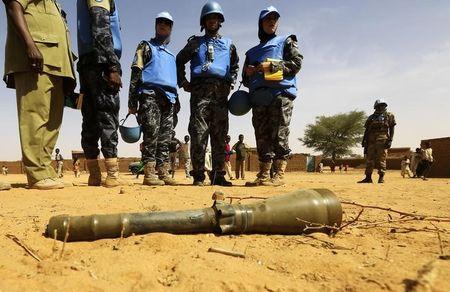Advertisement
Sudan withholding rations for Darfur peacekeepers: Britain
UNITED NATIONS (Reuters) - For weeks the government of Sudan has been refusing to release rations and other essential supplies for international peacekeepers in the conflict-torn Darfur region, Britain's ambassador to the United Nations said on Wednesday.
British envoy Matthew Rycroft added that he was planning to raise the issue of the United Nations-African Union peacekeeping mission in Darfur, known as UNAMID, during Wednesday's meeting of the U.N. Security Council on unrelated issues.
"We're very worried that the government of Sudan is preventing UNAMID from doing its job, specifically they are holding up crucial rations and other supplies in Port Sudan that are destined to go to the UNAMID troops," he told reporters on the way into the council chamber.
"They are not complying with their obligations to support UNAMID," he said, adding that the quantity was significant.
If the supplies are not released quickly, he said UNAMID would have to make alternative arrangements which would increase the monthly cost for such supplies to UNAMID would jump from some $3 million to around $13 million.
Rycroft said representatives of the Sudanese government have denied knowledge of the rations being withheld at Port Sudan.
A Security Council diplomat, speaking on condition of anonymity, said earlier that there were around 175 containers of supplies stuck at the port. However, a U.N. official said the actual number of containers was higher, around 190.
A senior diplomat from Sudan's U.N. mission did not respond immediately to a request from Reuters for a comment.
Relations between Khartoum and UNAMID have never been good but have deteriorated in recent years. Late last year Khartoum ordered UNAMID out of Sudan after it began investigating an alleged mass rape by Sudanese soldiers in Darfur. The government denies any wrongdoing by either its army or allied militia.
The Darfur conflict began in 2003 when mainly non-Arab tribes took up arms against the Arab-led government in Khartoum, accusing it of discrimination. The mass killings of a decade ago have eased, but the insurgency continues and Khartoum has sharply escalated attacks on rebel groups over the past year.
(Reporting by Louis Charbonneau; Editing by David Gregorio)



















Add new comment